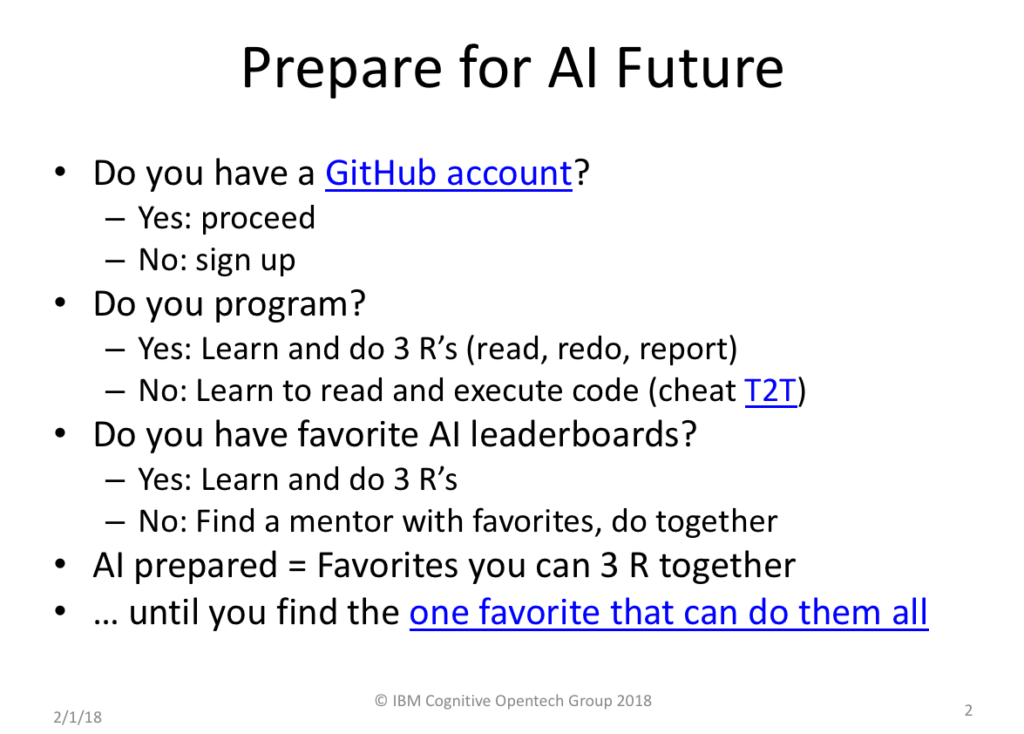(1) Artificial Intelligence Augmentation
Carter, S., & Nielsen, M. (2017). Using Artificial Intelligence to Augment Human Intelligence: By creating user interfaces which let us work with the representations inside machine learning models, we can give people new tools for reasoning. Distill. https://distill.pub/2017/aia
“In the 1950s a different vision of what computers are for began to develop. That vision was crystallized in 1962, when Douglas Engelbart proposed that computers could be used as a way of augmenting human intellect. In this view, computers weren’t primarily tools for solving number-crunching problems. Rather, they were real-time interactive systems, with rich inputs and outputs, that humans could work with to support and expand their own problem-solving process. This vision of intelligence augmentation (IA) deeply influenced many others, including researchers such as Alan Kay at Xerox PARC, entrepreneurs such as Steve Jobs at Apple, and led to many of the key ideas of modern computing systems. Its ideas have also deeply influenced digital art and music, and fields such as interaction design, data visualization, computational creativity, and human-computer interaction.”
“Research on IA has often been in competition with research on artificial intelligence (AI): competition for funding, competition for the interest of talented researchers. Although there has always been overlap between the fields, IA has typically focused on building systems which put humans and machines to work together, while AI has focused on complete outsourcing of intellectual tasks to machines. In particular, problems in AI are often framed in terms of matching or surpassing human performance: beating humans at chess or Go; learning to recognize speech and images or translating language as well as humans; and so on.”
“This essay describes a new field, emerging today out of a synthesis of AI and IA. For this field, we suggest the name artificial intelligence augmentation (AIA): the use of AI systems to help develop new methods for intelligence augmentation. This new field introduces important new fundamental questions, questions not associated to either parent field. We believe the principles and systems of AIA will be radically different to most existing systems.”
“Our essay begins with a survey of recent technical work hinting at artificial intelligence augmentation, including work on generative interfaces – that is, interfaces which can be used to explore and visualize generative machine learning models. Such interfaces develop a kind of cartography of generative models, ways for humans to explore and make meaning from those models, and to incorporate what those models “know” into their creative work.”
This paper demonstrates the almost “magical” ability of AI to generate images, and other context, that would require skilled people a great deal of time to draw/create. Will be interesting when things progress from content generation to game generation – I suspect it will start as “really bad” versions of existing games – see: https://en.wikipedia.org/wiki/Really_Bad_Chess (this is a great and fun game – a creative “twist” on real chess, but in some ways perhaps more exciting than real chess)
(2) Partner Technologies
McGee, K., & Hedborg, J. (2004). Partner Technologies: an alternative to technology masters & servants. In Proc. COSIGN.: http://citeseerx.ist.psu.edu/viewdoc/download?doi=10.1.1.60.1188&rep=rep1&type=pdf
“When it comes to the design of intelligent technologies intended to empower people, much of it is guided by two central metaphors: technologies as servants or as masters. Servant technologies can be empowering because they reduce or remove work that people find difficult, dirty, or dangerous; master technologies can be empowering because they instruct, inform, remind, cajole, nag, or otherwise force people to do things which are important – but which, for whatever reasons, people do not (or cannot) do without this assistance.”
“For many kinds of activities and contexts these guiding metaphors do indeed seem useful. But there are activities where a dynamic, creative partnership among equals seems like the more appropriate model of empowerment – as in the case of musical co-improvisation by jazz groups, where particular collections of individuals mutually inspire and support each other. Not only do good partnerships seem to help people attain or sustain powerful engagement in their current activities, in some cases they seem to enable people to successfully enter new activities.”
(3) Intelligence Cognitive Assistants (ICA) Workshop
Requires registration but some great presentations on this topic here: https://www.src.org/calendar/e006378/
Thanks for pointers to these papers from:
(1) Don Norman, https://twitter.com/JimSpohrer/status/945379167431933952
(2) Mattias Arvola, https://twitter.com/MattiasArvola/status/943381280699371522


